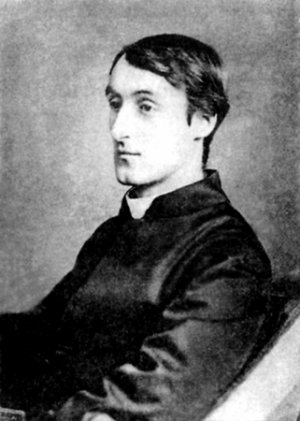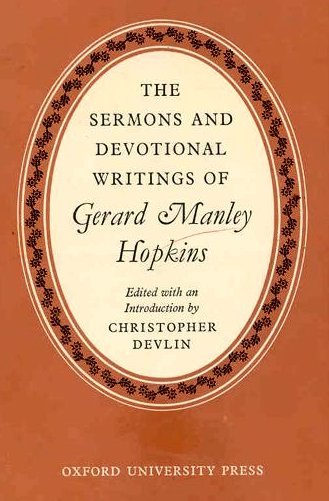Fleurs du Mal Magazine


Or see the index
.jpg)
Gerard Manley Hopkins
(1844-1889)
Inversnaid
This darksome burn, horseback brown,
His rollrock highroad roaring down,
In coop and in comb the fleece of his foam
Flutes and low to the lake falls home.
A windpuff-bonnet of fawn-froth
Turns and twindles over the broth
Of a pool so pitchblack, fell-frowning,
It rounds and rounds Despair to drowning.
Degged with dew, dappled with dew,
Are the groins of the braes that the brook treads through,
Wiry heathpacks, flitches of fern,
And the beadbonny ash that sits over the burn.
What would the world be, once bereft
Of wet and wildness? Let them be left,
O let them be left, wildness and wet;
Long live the weeds and the wilderness yet.
I wake and feel the fell of dark
I wake and feel the fell of dark, not day,
What hours, O what black hours we have spent
This night! what sights you, heart, saw; ways you went!
And more must, in yet longer light’s delay.
With witness I speak this. But where I say
Hours I mean years, mean life. And my lament
Is cries countless, cries like dead letters sent
To dearest him that lives alas! away.
I am gall, I am heartburn. God’s most deep decree
Bitter would have me taste: my taste was me;
Bones built in me, flesh filled, blood brimmed the curse.
Selfyeast of spirit a dull dough sours. I see
The lost are like this, and their scourge to be
As I am mine, their sweating selves; but worse.
![]()
Gerard Manley Hopkins poetry
kempis poetry magazine
More in: Hopkins, Gerard Manley

G e r a r d M a n l e y H o p k i n s
(1844-1889)
The Lantern out of Doors
SOMETIMES a lantern moves along the night,
That interests our eyes. And who goes there?
I think; where from and bound, I wonder, where,
With, all down darkness wide, his wading light?
Men go by me whom either beauty bright
In mould or mind or what not else makes rare:
They rain against our much-thick and marsh air
Rich beams, till death or distance buys them quite.
Death or distance soon consumes them: wind
What most I may eye after, be in at the end
I cannot, and out of sight is out of mind.
Christ minds: Christ’s interest, what to avow or amend
There, éyes them, heart wánts, care haúnts, foot
fóllows kínd,
Their ránsom, théir rescue, ánd first, fást, last friénd.
Caged Skylark
As a dare-gale skylark scanted in a dull cage
Man’s mounting spirit in his bone-house, mean house,
dwells–
That bird beyond the remembering his free fells;
This in drudgery, day-labouring-out life’s age.
Though aloft on turf or perch or poor low stage,
Both sing sometimes the sweetest, sweetest spells,
Yet both droop deadly sometimes in their cells
Or wring their barriers in bursts of fear or rage.
Not that the sweet-fowl, song-fowl, needs no rest–
Why, hear him, hear him babble and drop down to his nest,
But his own nest, wild nest, no prison.
Man’s spirit will be flesh-bound when found at best,
But uncumbered: meadow-down is not distressed
For a rainbow footing it nor he for his bónes rísen.

The May Magnificat
MAY is Mary’s month, and I
Muse at that and wonder why:
Her feasts follow reason,
Dated due to season–
Candlemas, Lady Day;
But the Lady Month, May,
Why fasten that upon her,
With a feasting in her honour?
Is it only its being brighter
Than the most are must delight her?
Is it opportunest
And flowers finds soonest?
Ask of her, the mighty mother:
Her reply puts this other
Question: What is Spring?–
Growth in every thing–
Flesh and fleece, fur and feather,
Grass and green world all together;
Star-eyed strawberry-breasted
Throstle above her nested
Cluster of bugle blue eggs thin
Forms and warms the life within;
And bird and blossom swell
In sod or sheath or shell.
All things rising, all things sizing
Mary sees, sympathising
With that world of good,
Nature’s motherhood.
Their magnifying of each its kind
With delight calls to mind
How she did in her stored
Magnify the Lord.
Well but there was more than this:
Spring’s universal bliss
Much, had much to say
To offering Mary May.
When drop-of-blood-and-foam-dapple
Bloom lights the orchard-apple
And thicket and thorp are merry
With silver-surfèd cherry
And azuring-over greybell makes
Wood banks and brakes wash wet like lakes
And magic cuckoocall
Caps, clears, and clinches all–
This ecstacy all through mothering earth
Tells Mary her mirth till Christ’s birth
To remember and exultation
In God who was her salvation.
More in: Hopkins, Gerard Manley
Thank you for reading Fleurs du Mal - magazine for art & literature